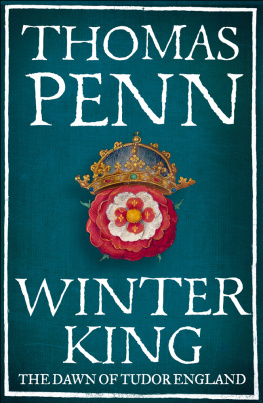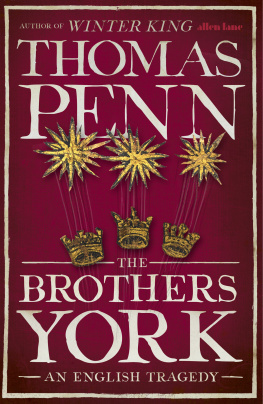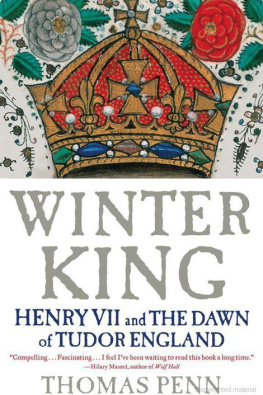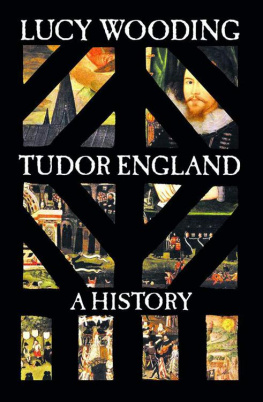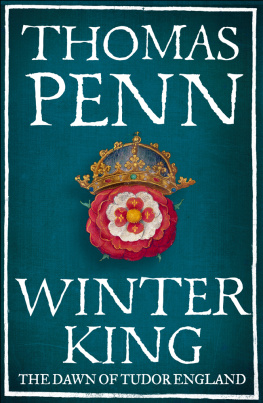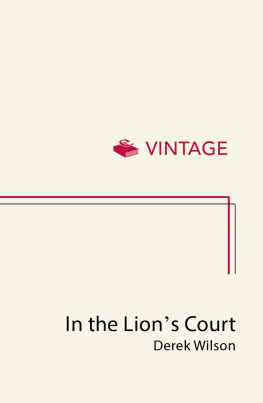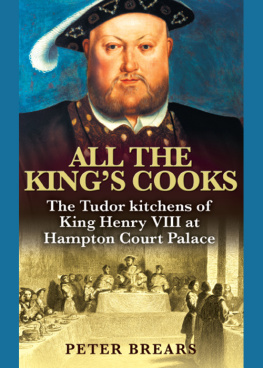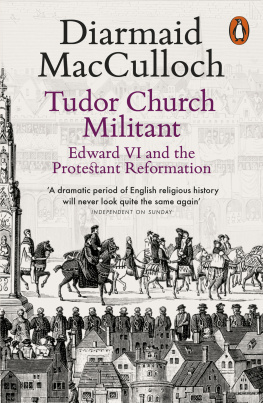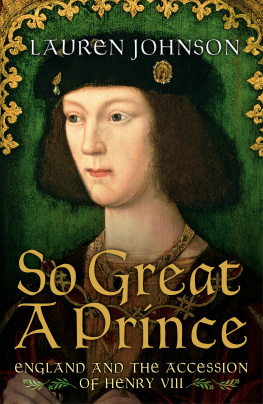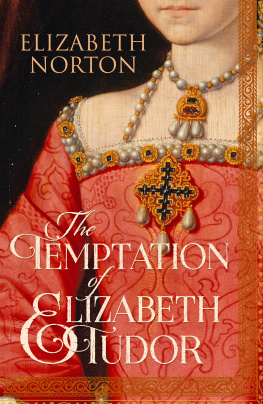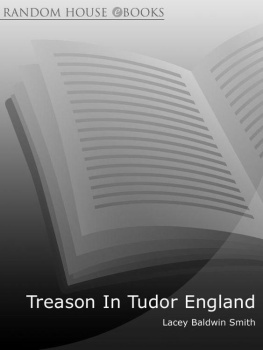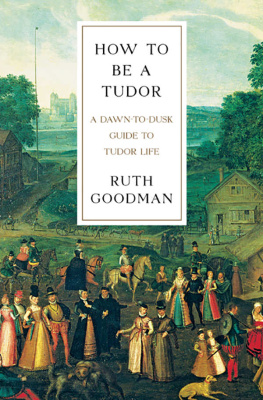Thomas Penn - Winter King: The Dawn of Tudor England
Here you can read online Thomas Penn - Winter King: The Dawn of Tudor England full text of the book (entire story) in english for free. Download pdf and epub, get meaning, cover and reviews about this ebook. year: 2011, publisher: Penguin, genre: Non-fiction. Description of the work, (preface) as well as reviews are available. Best literature library LitArk.com created for fans of good reading and offers a wide selection of genres:
Romance novel
Science fiction
Adventure
Detective
Science
History
Home and family
Prose
Art
Politics
Computer
Non-fiction
Religion
Business
Children
Humor
Choose a favorite category and find really read worthwhile books. Enjoy immersion in the world of imagination, feel the emotions of the characters or learn something new for yourself, make an fascinating discovery.
- Book:Winter King: The Dawn of Tudor England
- Author:
- Publisher:Penguin
- Genre:
- Year:2011
- Rating:5 / 5
- Favourites:Add to favourites
- Your mark:
- 100
- 1
- 2
- 3
- 4
- 5
Winter King: The Dawn of Tudor England: summary, description and annotation
We offer to read an annotation, description, summary or preface (depends on what the author of the book "Winter King: The Dawn of Tudor England" wrote himself). If you haven't found the necessary information about the book — write in the comments, we will try to find it.
Winter King: The Dawn of Tudor England — read online for free the complete book (whole text) full work
Below is the text of the book, divided by pages. System saving the place of the last page read, allows you to conveniently read the book "Winter King: The Dawn of Tudor England" online for free, without having to search again every time where you left off. Put a bookmark, and you can go to the page where you finished reading at any time.
Font size:
Interval:
Bookmark:

The Dawn of Tudor England

ALLEN LANE
an imprint of
PENGUIN BOOKS
ALLEN LANE
Published by the Penguin Group
Penguin Books Ltd, 80 Strand, London WC2R 0RL , England
Penguin Group (USA) Inc., 375 Hudson Street, New York, New York 10014, USA
Penguin Group (Canada), 90 Eglinton Avenue East, Suite 700, Toronto, Ontario, Canada M4P 2Y3
(a division of Pearson Penguin Canada Inc.)
Penguin Ireland, 25 St Stephens Green, Dublin 2, Ireland
(a division of Penguin Books Ltd)
Penguin Group (Australia), 250 Camberwell Road, Camberwell, Victoria 3124, Australia
(a division of Pearson Australia Group Pty Ltd)
Penguin Books India Pvt Ltd, 11 Community Centre, Panchsheel Park, New Delhi 110 017, India
Penguin Group (NZ), 67 Apollo Drive, Rosedale, Auckland 0632, New Zealand
(a division of Pearson New Zealand Ltd)
Penguin Books (South Africa) (Pty) Ltd, 24 Sturdee Avenue, Rosebank, Johannesburg 2196, South Africa
Penguin Books Ltd, Registered Offices: 80 Strand, London WC2R 0RL , England
www.penguin.com
First published 2011
Copyright Thomas Penn, 2011
The moral right of the author has been asserted
All rights reserved.
Without limiting the rights under copyright reserved above, no part of this publication may be reproduced, stored in or introduced into a retrieval system, or transmitted, in any form or by any means (electronic, mechanical, photocopying, recording or otherwise) without the prior written permission of both the copyright owner and the above publisher of this book
ISBN: 978-1-84-614509-4
For Kate
I love the rose both red and white.
Is that your pure, perfect appetite?
Thomas Phelyppes,
I love, I love and whom love ye? c. 1486
Since men love at their own pleasure and fear at the pleasure of the prince, the wise prince should build his foundation upon that which is his own, not upon that which belongs to others: only he must seek to avoid being hated.
Machiavelli, The Prince

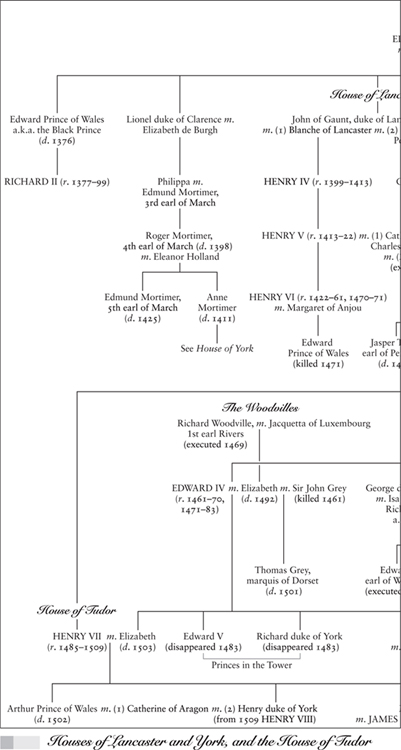
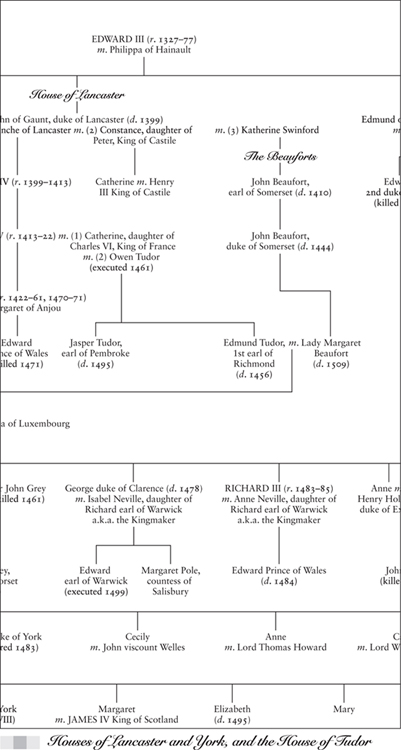
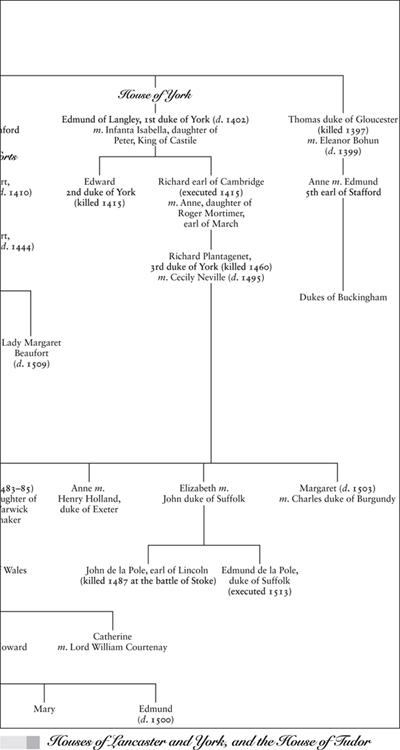
I have met with a great deal of kindness and generosity in the course of writing this book. Staff at the British Library, The National Archives, Cambridge University Library and the Bodleian Library have all dealt with my enquiries with patience and helpfulness. Christine Reynolds facilitated my visits to Westminster Abbey Muniments, while Malcolm Underwoods hospitality and erudition made my time in the archives at St Johns College, Cambridge a pleasure.
Margaret Condon, Cliff Davies, John Watts, Adrian Ailes and Samantha Harper have all been generous with their time, and in sharing information and documents.
I am particularly indebted to those who have read though drafts of part or all of the book: Diarmaid MacCulloch and Carl Watkins; Steven Gunn, who also kindly allowed me to look at an early chapter of his forthcoming book on Henry VIIs new men; Sean Cunningham and James Ross, who have both been great funds of encouragement and insight; and Rosemary Horrox, whose discernment and attentiveness I have been fortunate enough to enjoy a second time.
I am lucky in the friendship of Michael Peel, Jon Butler, Ed, Linda and Tom Harvey, and John Berger. Thanks, too, are due to Tariq Ali, Perry Anderson, and colleagues at Verso: Jacob Stevens, Rowan Wilson, Bob Bhamra, Tania Palmieri, Tamar Shlaim, Sarah Shin and Anwar Fazul.
My thanks to all at Penguin, in particular Simon Winder for his perceptive editing and enthusiastic support; I am also grateful to Jenny Fry, Natalie Ramm, Marina Kemp and Richard Duguid. Charlotte Ridings has been a painstaking copy-editor. I would also like to thank Bob Bender at Simon and Schuster US and, at Aitken Alexander, Anna Stein and especially Andrew Kidd, who has been a source of calm advice, reassurance and friendship throughout.
Lastly, I owe more than I can say to my parents, Alan and Jessica; and to Kate Harvey, without whose love and support I could not have written this book.
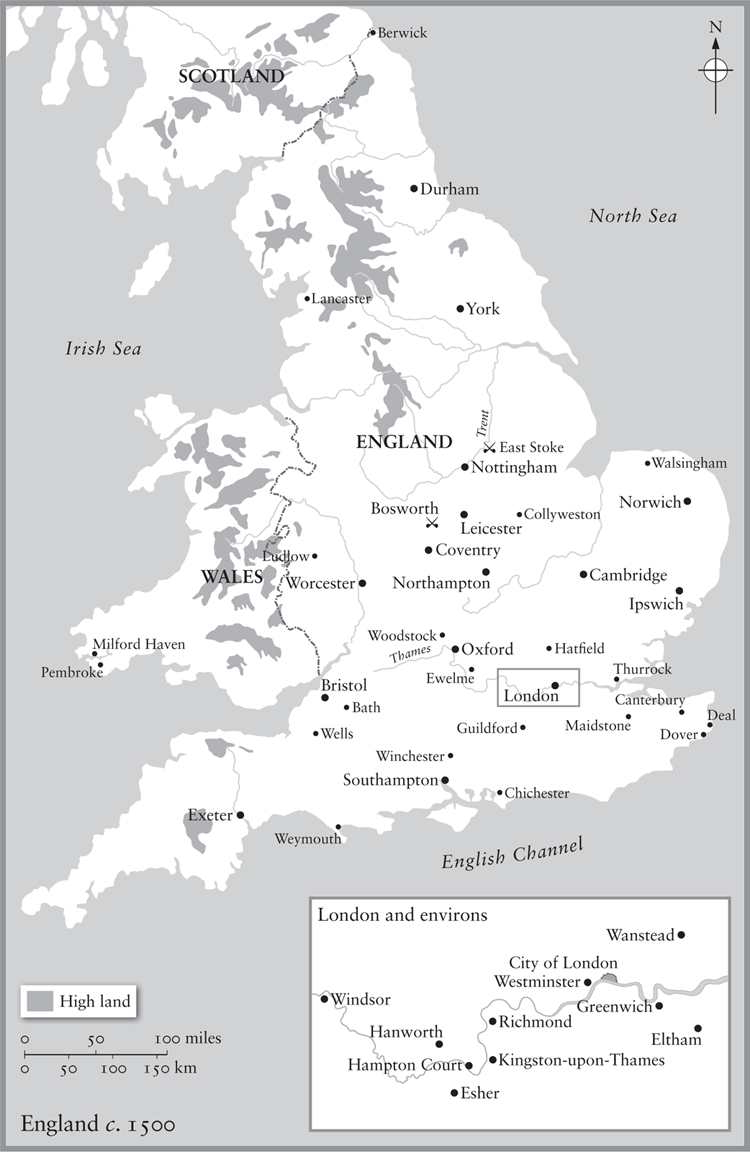
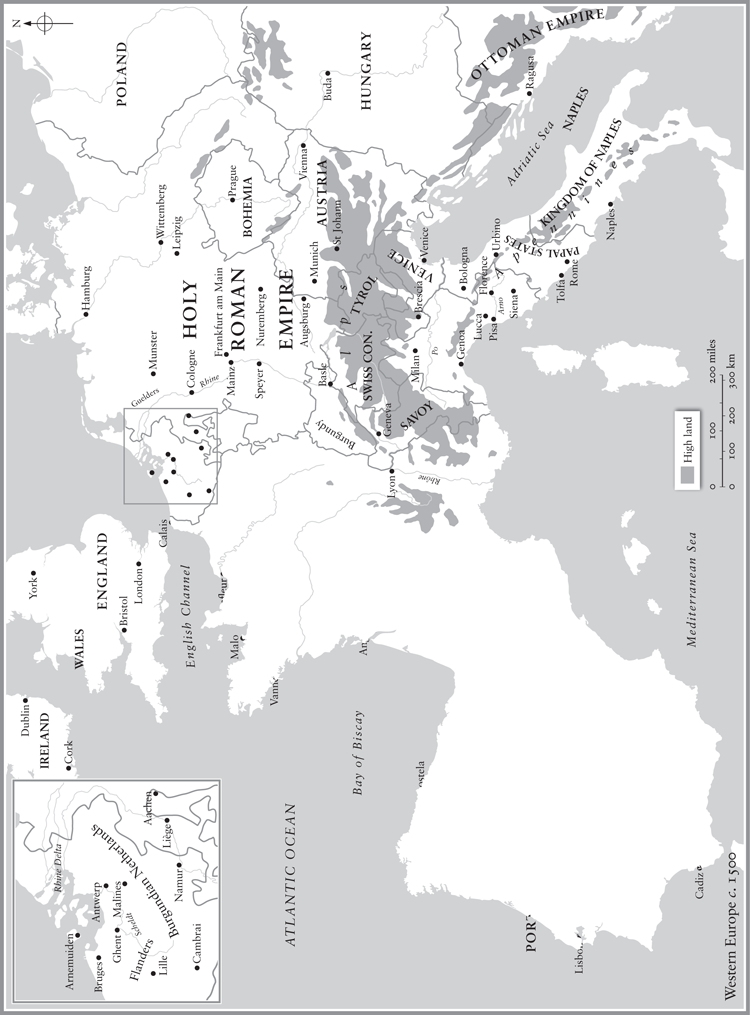
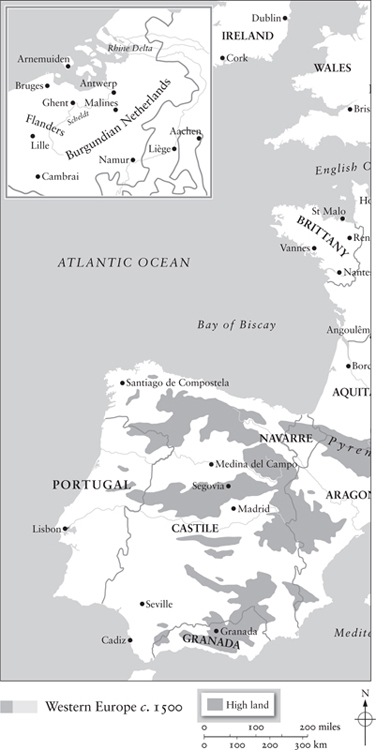
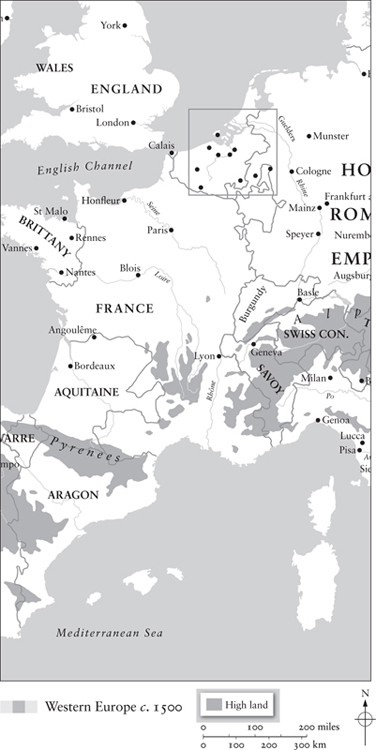
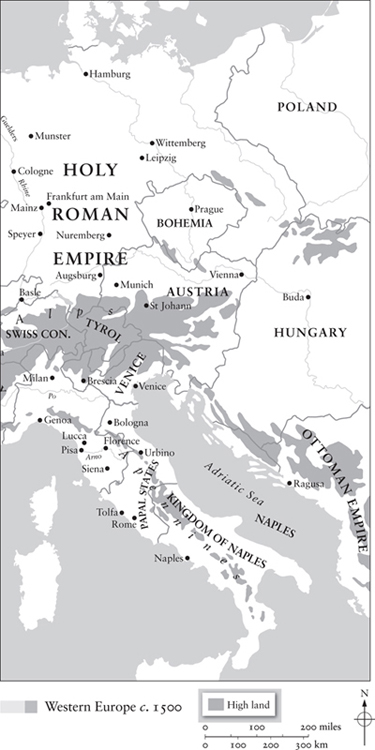
Henry VII ruled England for almost a quarter-century, from 1485 to 1509. During his reign, the civil wars that had convulsed the country for much of the fifteenth century burned themselves out. By its end, he had laid the foundations for the dynasty that bore his name: Tudor. He was a man with a highly dubious claim to the throne, who seized power and passed it on in the first untroubled succession in almost a century. Yet, wedged between two of the most notorious monarchs in English history the arch-villain Richard III and the massive figure of Henry VIII Henry VII remains mysterious, or as his first biographer, the seventeenth-century political thinker Francis Bacon put it, a dark prince.
In English history, Henry VIIs reign is still widely understood as a time of transition, one in which the violent feuds of the previous decades gave way to a glorious age of renaissance and reformation. This was the myth that the Tudors themselves built. The later Tudors referred to Henry VII as we now see him: the unifier of a war-torn land, a wise king who brought justice and stability, and who set the crown on a sound financial footing. Nonetheless they were unable to eradicate the lingering sense of a reign that degenerated into oppression, extortion and a kind of terror, at its core an avaricious Machiavellian king who inspired not love but fear. In calling him a dark prince, Bacons emphasis was on the sinister as well as the opaque. Henry VII, he wrote, was infinitely suspicious and he was right to be so, for his times were full of secret conspiracies and troubles. Perhaps the most telling verdict of all is that of Shakespeare, who omits Henry VII altogether from his sequence of history plays and not for want of material but, one suspects, because the reign was simply too uncomfortable to deal with.
Next pageFont size:
Interval:
Bookmark:
Similar books «Winter King: The Dawn of Tudor England»
Look at similar books to Winter King: The Dawn of Tudor England. We have selected literature similar in name and meaning in the hope of providing readers with more options to find new, interesting, not yet read works.
Discussion, reviews of the book Winter King: The Dawn of Tudor England and just readers' own opinions. Leave your comments, write what you think about the work, its meaning or the main characters. Specify what exactly you liked and what you didn't like, and why you think so.

